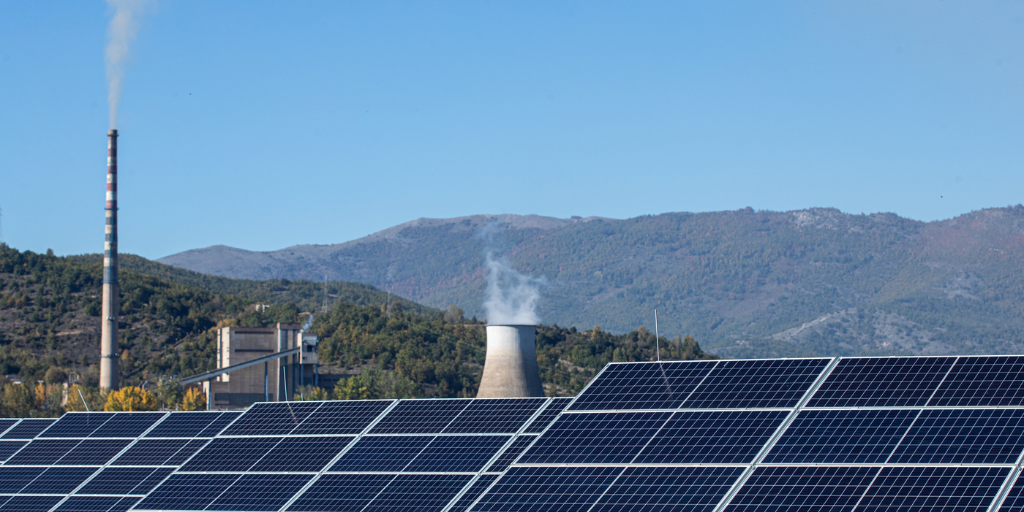The European Bank for Reconstruction and Development (EBRD) is set to decide the future of its energy investments right after the latest round of UN climate negotiations concludes this week. Its Executive Directors must heed the EU’s call for a fossil fuel subsidy phase-out
Pippa Gallop, Southeast Europe Energy Policy Officer, Gligor Radečić, Gas Campaigner | 12 December 2023

An ex-coal mine reworked as North Macedonia’s first large solar plant, Source: Western Balkans Investment Framework via wikimedia commons
For this year’s UN climate summit, the EU has chosen to champion the call for phasing out fossil fuel subsidies. Yet, on Thursday, December 14, barely two days after COP28 is scheduled to conclude, the board of directors of the European Bank for Reconstruction and Development (EBRD), where EU governments and institutions collectively own over half the shares, could be greenlighting a policy that allows public money to continue enabling fossil gas projects.
The board will be deciding on a new energy lending strategy to guide the Bank’s investments and policy initiatives for the next five years. But the draft strategy published for consultation in July 2023, shows that the Bank still refuses to rule out financing fossil gas, even after fossil energy companies have posted record profits.
The draft leaves the door open for midstream and downstream gas investments, i.e. gas pipelines and power plants, subject to a long list of conditions. The sheer number of conditions may look impressive at first glance, but some are simply requirements of the EBRD’s environmental and social standards that anyway apply to any project supported by the Bank, while others are vague and open for interpretation.
The EBRD has been boasting that since January 2023 it is in ‘full alignment’ with the Paris Agreement. Yet, instead of finally ending all financial support to fossil fuels, the draft strategy’s complex and vague criteria only expose the poor reasoning behind it.
The case against new fossil fuel infrastructure is clear. The scientific consensus indicates that there is no room for new gas if we aim to stay below the 1.5-degree Celsius target set in the Paris Agreement.
In recent years, the EBRD has increased its renewables investments and decreased its support for fossil fuels, but this is no longer enough. Since its exit from coal in 2018, the EBRD has continued to finance carbon-intensive fossil fuel projects.
Despite its mission to promote environmentally sound and sustainable development, from 2018 to 2021, the Bank invested EUR 2.9 billion in oil and gas, averaging EUR 741 million per year, compared to EUR 5.6 billion invested in clean energy during the same period—an average of EUR 1.4 billion per year. Some of the projects funded since 2018 include a liquified gas terminal in Cyprus, facing constant delays in its construction, and the 1500 MW Syrdarya gas-fired power plant in Uzbekistan.
Currently, the Bank is mulling support for a gas pipeline between Greece and North Macedonia, with other projects also under consideration. The pipeline’s alleged ‘Paris alignment’ rests on the idea that it will be ‘hydrogen-ready,’ based on a technically and economically unproven theory that renewables-based hydrogen will eventually become an affordable fuel to replace fossil gas.
Not counting the greenhouse gas emissions from burning the gas transported by the pipeline in the project’s environmental assessment may have helped to support this bizarre conclusion as well. Hiding behind such methodological sleights of hand also ignores the fact that solar and wind power are already cheaper and readily available.
The EBRD’s lack of climate leadership sends the wrong signal to the Bank’s countries of operation about how the energy transition should look.
As one of Europe’s most influential state-owned investors in the energy industry the EBRD holds significant sway in development of its countries of operation. Its investments span central and eastern Europe, the Caucasus and central Asia, Turkey and, more recently, parts of north Africa and the Middle East. Many of these countries are heavily reliant on fossil fuels for energy and are among the most vulnerable due to climate change.
The EBRD has an opportunity and an obligation to speed up a just energy transition that is genuinely sustainable. Investments in power grids and heating technologies – from heat pumps to geothermal energy to solar thermal – are desperately needed throughout the EBRD’s countries of operation and are particularly crucial if the Bank is to address deepening energy poverty.
The EBRD must prioritise energy efficiency, both on the policy and project level. Investing in insulation and retrofitting residential buildings — thus significantly cutting energy consumption and energy bills — instead of channelling money to fossil fuels, should be a no-brainer.
Continued EBRD financing of fossil fuels at this stage of the climate emergency is indefensible. 2023 has so far shattered all climate records, bringing increased storms, floods, droughts and wildfires in Libya, Canada, South America, the Bay of Bengal, Greece, the Horn of Africa and beyond.
Fossil fuel subsidies are still a massive elephant in the room that needs to be tackled yesterday. The EBRD’s next energy strategy is a chance for the Bank to join the right side of history. When they vote on the new energy strategy, EBRD board directors representing EU governments must heed the EU’s call to halt fossil fuel subsidies and ensure the Bank is finally part of the climate solution, not the problem.
Never miss an update
We expose the risks of international public finance and bring critical updates from the ground – straight to your inbox.
Institution: EBRD
Tags: EBRD | fossil fuels
